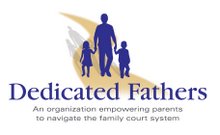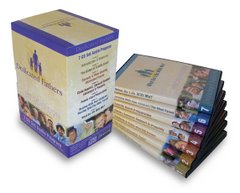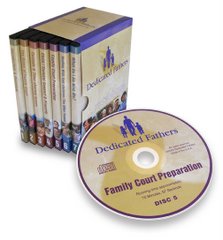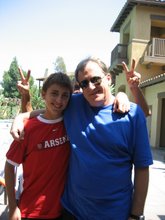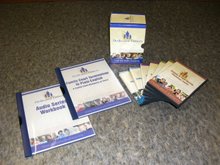Fathers to ride over 600 miles for Equality in Parenting Rights!
From daddyblogger.com
It is official! August 11th 2007 Robert Pedersen and Rob Mackenzie will start their over 600 mile bicycle trek from the Lansing Capitol to Washington, D.C.. This will be an intense multi-day bike trek through numerous states ending in Washington, D.C. where they will be greeted by thousands of people attending the national rally in Washington, D.C. on August the 18th.
It is simply amazing that two fathers are going to attempt this trip all in the name and support of shared parenting! They do this to protect a child's right to EQUAL time with BOTH fit parents! Many elected officials and supporters will see the riders off at the Lansing Capitol and thousands will greet them in Washington, D.C.
Follow this link for the entire story:
http://daddy.typepad.com/daddyblog/2007/04/robert_and_rob_.html
www.dedicatedfathers.org
Monday, May 21, 2007
Robert and Rob EQUAL parenting bike trek!
Posted by
Dedicated Father
at
7:51 PM
4
comments
![]()
Labels: child custody, child support, children, dads, divorce, divorce coach, equal rights, family court, kids, parent, parenting rights
Friday, May 18, 2007
Family Court: Preparing for your Divorce Case
Preparing Your Divorce Case
www.dedicatedfathers.org
Step 1: KEEPING A JOURNAL
Immediately upon knowing you will be going into family court (or when you think you are heading into family court), one of the first and most important things you need to start doing is keeping journal of all significant events concerning you, your children, your finances and the other parent.
More often than not, each time you go to your divorce or child custody hearings you will need to provide a statement as to specifically what you want and justification for why you should get it. This written statement is called your “declaration.” The information in your declaration is taken directly from your written journal as outlined above.
In family court, some judges will not listen to what you have to say verbally. They will rely totally on what you have written in your papers and what the other parent has written in their responsive papers. Therefore, writing your declaration may be a very critical part of whether or not you get what you are asking for, which makes your journal entries extremely important to your case.
Step 2: PREPARING TO WRITE YOUR DECLARATION
Stay away from bringing up negative issues about the other parent, it usually makes you and not the other parent, look bad in the eyes of the court. However, many times in response to issues raised by the other parent, you will need to respond by bring up negative issues. Likewise, many times the only way to show a substantial change of circumstances affecting the best interest of your child is to bring up negative issues about the other parent. However, be very careful in the way you bring up those negative issues.
Only bring up negative issues IF you can show, demonstrate or prove how it directly affects your child or your relationship with your child - otherwise, leave it alone.
The cardinal rule of bringing up negative issues is that you always, always, always, label the negative issues as “CONCERNS.” Example: “I am concerned that every time I go to pick up our child, the other parent is never at home. I believe this confuses our child and allows our child to believe I have not come to see them and do not care about them, which is simply not true and not in our child’s best interests.”
Step 3: WRITING YOUR DECLARATION
Your declaration is simply your very clearly written statement of what has happened, including all dates whenever possible, which clearly provide the court with the reasons and justifications for the order you want the court to make. Every request you make needs to have a reason or justification for it. The judge knows absolutely nothing about you or your case. You need to bring the judge up to speed about your case very quickly (they don’t have much time to review each case, maybe 5 to 10 minutes at most).
Whenever possible, attach proof or evidence which supports what you are writing. If you do not have the proof or evidence, then state where such evidence is located. Some ideas as to proof or evidence may be pictures of you and your children enjoying your time together, statements from witnesses who have seen you interact with your children, time cards showing when you actually work, letters from teachers or church leaders as to your involvement with school and church. Get creative, but be able to back up your claims.
Step 4: THE COURT FILE
You will want to ensure you have an exact copy of the court divorce file, which you can get from the County Clerk at your family courthouse. Your court divorce file is needed so whomever is assisting you can see what has happened so far in your case.
Also, there are many times wherein something which has happened before will prevent you from bringing up the same issues again - a review of your court file will let you know this information. Additionally, there are many times wherein new or different paperwork is required based on what has happened before - again, a review of your court file will let you know this information.
Therefore, you will want to keep and maintain an up-to-date court file at all times.
Step 5: CHILD SUPPORT AND SPOUSAL SUPPORT (ALIMONY)
It is in your best interests to start getting copies of all canceled checks made for any kind of support you have paid and ensure you make copies of both the front and the back of those checks. Additionally, ensure you put on the check itself on the bottom left hand “comments” section that the check is for “child support” or “spousal support.”
IF YOU CAN’T PROVE YOU HAVE PAID IT, YOU OWE IT !
Never, ever pay any type of support in cash. Why? Because there is no way to prove the other parent received the money if you do not have a copy of the other parent’s signature and deposit notations from your canceled check.
Step 6: MAINTAIN ORGANIZED FILES OF EVERYTHING
You will eventually have numerous files about your divorce or child custody case which you will want to maintain and keep organized at all times. Some of the files you will want to keep are as follows:
A) One file for all correspondence with the other parent kept in chronological
order;
B) One file for all correspondence with your attorney and/or paralegal kept in
chronological order;
C) One file for all correspondence with the other parent’s family law attorney kept in chronological order;
D) One file for all correspondence with the state agency collecting support
payments kept in chronological order; and
E) One file of all proof of all payments made for support (including both the front and the back of canceled checks).
Step 7: CONSULTATION WITH AN ATTORNEY AND/OR PARALEGAL
Armed with all of the information as outlined in Step 1 through Step 6 above, you are now ready to consult with a family law attorney, paralegal and or support organization about your divorce or child custody case.
One last thing:
"Not everything that is faced can be changed, but nothing can be changed until
it is faced." ---James Baldwin
By: Marvin Chapman
Order the Dedicated Fathers Audio Series Today!
Posted by
Dedicated Father
at
1:25 PM
87
comments
![]()
Labels: child abuse, child custody, child support, court case, dads, dedicated fathers, divorce, divorce coach, divorce mediation, family court, family court system, fathers rights, law
Thursday, May 3, 2007
Child Abuse, Divorce, and Child Custody
ALLEGATIONS OF CHILD ABUSE
Divorce & Child Custody (part 2)
By: Marvin Chapman
www.dedicatedfathers.org
In the California Family Code Section 3027.1 it states the following:
“If a court determines...that an accusation of child abuse or neglect made during a child custody proceeding is false and the person making the accusation knew it to be false at the time the accusation was made, the court may impose reasonable money sanctions, not to exceed all costs incurred by the party accused as a direct result of defending the accusation, and reasonable attorney’s fees incurred in recovering the sanctions, against the person making the accusation.”
In over 26 years in the family court arena, I have never experienced nor have I ever heard of any judge actually determining someone has knowingly made a false allegation of child abuse.
Pretty amazing fact when you consider the following:
Outside of family court: Independent third parties are generally the ones making the allegations.
Outside of family court: Mothers are found responsible for 49% of child abuse cases (with fathers, other relatives and strangers making up the other 51%).
Inside family court: By an overwhelming majority, it is mothers who make allegations against fathers [even though statistically, the mother has a higher probability of committing abuse (49% of all cases as shown above). This fact is totally ignored in family court.
Inside family court: The vast majority of the allegations can not be verified or validated; however, the father is almost always treated as guilty from day one.
Research shows that upon the accusation of child abuse in family court, the presumption of guilt is taken for granted by the majority of attorneys and judges. Therefore from the onset, an accused father is treated as though he were guilty. As indicated in Part 1 of this Allegations of Child Abuse section, in family court (divorce court) child abuse allegations require no proof, no validation, no verification, no police reports, nor any other tangible evidence - the mere unsubstantiated allegation will do.
Research also shows mothers often obtain sole custody of the children, terminate or severely restrict visitation with the father, then request an increase in child support due to the reduced time the father has with his children. All of these consequences tearing apart the restructuring family, severely damaging father-child relationships, injuring the father emotionally, and many times destroying the father financially. All of this trauma built around unfounded false allegations. With such devastating consequences you would think family courts would be more pro-active in going after those who make false allegations. Unfortuantely for the families involved, not only do the courts not go after those making false allegations pro-actively, they don’t go after them at all!
The author of this article, Marvin Chapman, has a great website devoted to fathers rights and divorce. Why not check it out?
Visit www.unitedfathers.org
Defend Your Rights Today!
Order the Dedicated Fathers Audio Series Now!
Posted by
Dedicated Father
at
7:15 PM
7
comments
![]()
Labels: child abuse, child custody, children, dads, divorce coach, domestic violence, family court, fathers rights, kids, paternity
Sunday, April 22, 2007
Divorce & Child Custody - Child Abuse
Divorce & Child Custody:
ALLEGATIONS OF CHILD ABUSE
Part 1 of 2
By: Marvin Chapman
www.dedicatedfathers.org
www.unitedfathers.org
Research verifies mothers are responsible for 49% of all child abuse cases (with other relatives, strangers and fathers making up the other 51%).
In family court, twice as many mothers make child abuse allegations against fathers as do fathers against mothers.
Therefore, the mother making the allegation of child abuse against the father in a divorce is much more likely to be the perpetrator of the abuse than is the father.
Unfortuantely, the above facts are totally ignored by family courts.
In family court, the normal standards of evidence required for common criminals do not apply. In family court, child abuse allegations require no proof, no validation, no verification, no police reports, nor any other tangible evidence - the mere unsubstantiated allegation will do. Research proves upon the accusation of child abuse in family court, the presumption of guilt is taken for granted by the majority of attorneys and judges. Therefore, in family court, unsubstantiated hearsay allegations of abuse is all it takes for a father to be “guilty,” along with all the consequences which go with that “guilty” verdict. From the onset, the father will be treated as though he were found guilty in a real court.
Because the presumption of guilt is taken for granted by the majority of attorneys and judges in family court, the father will almost immediately be separated from his children - at least until he can “prove” his innocence. How does a father prove his innocence? How does he prove something did not happen? The reality is, he can’t. The very fact something did not happen prevents him from proving the non-happening of the non-event. It is a very well known and accepted fact that you can not prove the non-happening of a non-event - that is, except in family court.
During a divorce, the mere allegation of child abuse can and most of the time will cause an irreparable breakdown of the accused parent-child relationship. At the very least the previously healthy parent-child relationship will be disrupted and interfered with unnecessarily. The accused parent will typically become defensive and in the effort to prove their innocence, they will many times unwittingly distance themselves from their child, which is then used against them as verification of some form of abuse. With false allegations of abuse only the mothers win - fathers, children and father-child relationships all lose in some way or another.
Research also shows that mothers often obtain sole custody of their child, terminate visitation with the father, and then request an increase in child support due to the reduced time the father has with their child. All of these consequences tearing apart the restructuring family and damaging the father-child relationship, destroying the father emotionally, and injuring the father financially, are all built around simple unfounded false allegations and hearsay.
Many times the falsely accused parent is stigmatized and their reputation tarnished by the false allegations. This stigma and tarnished reputation may stay with them even if they are eventually found to be factually innocent. Many innocent men lose their jobs, become depressed and walk away from it all. In today’s fear filled society, the mere allegation of child abuse within family court can damage a person for the rest of their lives. Personally, I have had clients commit suicide over such abuse allegations - even after they were determined to be factually innocent of all charges. They could not take their neighbors, former friends and co-workers continued scorn and ridicule.
Regardless of the dire consequences of destroying a man’s life, false allegations of abuse, both spousal and child, are allowed to continue unabated in family court around this country. What most people seem to miss is the fact that it is the children who suffer the most with false allegations of abuse in that their relationship with one of their parents will be irretrievably impaired. Issues of abandonment, rejection, hurt and an overwhelming sense of loss will accompany most of these children for the rest of their lives.
Whether fiction, fantasy, legal ploy, or some other reason, false allegations of abuse are an indication the accusing parent is at the very least immature and over-enmeshed, and at worse, malicious, vindictive and prone to do anything to make the other parent “pay” for their perceived wrongs.
What makes false allegations of spousal abuse and child abuse so absurd is that when the parents were together, the accused parent was a good, decent and trusted parent. But once the breakup began, the accused parent was magically transformed into a mean, angry, abusing man. Why the family court can not see this fact is beyond any sound logical reasoning.
The use of false allegations of spousal abuse and child abuse will only stop when the standard is raised wherein a parent must prove the abuse, verify, validate and substantiate the allegations. Until then, families will continue to be abused by the very system which alleges concerned about the “best interests of the child.” Abusing a parent through false allegations, treating the falsely accused parent as guilty, making orders emotionally rather than logically and with proof, validation, verification and substantiation, are not and will never be in the “best interests of the child.”
Fathers who only months ago were good care-giving, productive and protective fathers are now child abusers. It is insane the courts even allow most of these cases. A simple third party investigation, short and inexpensive, would prove not only did the alleged abuse not happen, the mother knew her allegation was untrue when she made it. Then, and only then, will there cease to be an incentive for these false allegations to be made in the first place.
Like spousal abuse, child abuse allegations require no proof, validation, verification, police reports or any other tangible evidence - the mere unsubstantiated allegation will do very nicely by itself. Just as in false allegations of spousal abuse, false allegations of child abuse are extremely common in family court. Given the current heightened awareness of child abductions and child abuse nationally, there is a lot of emotions around the allegations of child abuse - and family court is almost totally governed by emotions.
Family court judges are given wide discretionary powers unlike any other area of law. This vast discretionary power of family court judges allows them to make their orders without ever having to justify and without ever giving sound logical reasoning for the orders they make.
Just like false allegations of spousal abuse, the mere allegation of child abuse is a winner for mothers. In the majority of cases, the mere allegation of child abuse will subject the father to parenting classes (money), supervised visitation with their children (more money) and a higher child support order (much more money).
If for any reason you suspect the other parent may make allegations against you, if the other parent has a history of repeatedly getting really angry with you, or if the other parent has ever made other false allegations against you (“You don’t love me anymore.”), then you need to take steps to protect yourself and your children.
The Author of this article, Marvin Chapman, has a great website devoted to father’s rights and child custody. Why not check it out? www.dedicatedfathers.org
Also be sure to visit www.unitedfathers.org
Posted by
Dedicated Father
at
6:56 PM
112
comments
![]()
Labels: abuse, advice, child custody, child support, children, dads, divorce, divorce coach, domestic violence, family court, fathers rights, help, kids, parent
Monday, March 5, 2007
Divorce Coach - Divorce coaching vs. Individual therapy
COLLABORATIVE DIVORCE COACHING
vs
INDIVIDUAL THERAPY
Marvin L. Chapman, MFT, CFC
Licensed Marriage and Family Therapist, MFC27081
Clinical Forensic Counselor, F16841
Certified Collaborative Divorce Coach
marvin@unitedfathers.org
www.unitedfathers.org
www.dedicatedfathers.org
Many people wonder what the difference is between a mental health professional
providing divorce coaching and a mental health professional providing
individual therapy.
Simply put: The major difference between divorce coaching and individual therapy
is the client, not the coaching or the therapeutic process.
Traditionally, individual therapy involves the assumption that the client is coming into therapy due to some real or perceived “problem” which they want to understand,
discover or have “treatment” thereon because their coping skills and/or current
manner of dealing with their “problem” is not working for them. Due to this
traditional thinking, it has long been a given that if someone is in therapy, something is “wrong” with them. Insurance companies and managed care facilities have
traditionally indicated a more comfortable position in dealing with emotional
“problems” from the medical model.
Simplified, the medical model says there is a disease (the problem), the symptoms
must be documented (a diagnoses from the DSM, yet another medical model),and a plan is laid out as to how the client will be “healed” (from the clinician’s
therapeutic orientation, paradigm or model). Based on this medical model, the
therapist will focus on the client’s history to assist in determining how the
“disease” (the problem) came about.
Many times you will hear therapists talk about the “pathology” of a client.
Ever wonder what “pathology” really means? (Definition: “The science or
Doctrine of diseases. That part of medicine which explains the nature of diseases,
their causes and their symptoms.” As you can see from the definition,
even in their diction, therapists use the medical model.)
With an understanding of the “pathology” the therapist can allegedly determine the
cause of the problem (the diagnosis). The therapist then gives the client new ways of
thinking, coping or behaving that allegedly will work better for them in the future
(the healing or curing of the problem). Under this simplified model, the therapist is the empowered helping agent; the client is the one with the “problem.”
Divorce coaching is different from individual therapy. In coaching, the client is not perceived as having any particular “problem” and the divorce coach does not
assume any “pathology.” Problems and/or pathological issues are only
dealt with if they impede the divorce process, wherein a suggestion may be
given that the client might benefit from therapy with an outside independent therapist.
In coaching, the therapist joins with the client in a duet of cooperation. The coach, having a therapeutic and mediation background, educates, offers insights and
observations, gives possibilities, and, at times, may even propose certain strategies
for the client to consider.
The divorce coach is specifically trained in the collaborative process to work closely with the client in their development of skills needed to deal with critical issues involving the divorce. Although coaching may be very therapeutic, it is not therapy.
The divorce process, whether adversarial or collaborative, is a complex and deeply
emotional process. Grief issues, such as denial, anger, bargaining and depression are usually involved, as well as a sense of loss and, many times, confusion.
Post relationship co-parenting issues are always a difficult area, as are support
and property issues. Individual parenting styles is also an area of concern for
many parents (How do I answer my kids’ questions? How do I or should I discipline
the kids who are already hurting?). Divorce coaches in the collaborative model
not only have specialized training of the collaborative process, they are also
generally very experienced in working with restructuring families.
As indicated above, the major difference between divorce coaching and
individual therapy is the client (not the coaching or therapeutic process).
In therapy, the client is perceived as having a “problem” with a particular
“pathology” for which the client is seeking help. In divorce coaching,
the client is not perceived as having any particular “problem”, and the
divorce coach does not assume any “pathology.” The divorce coach uses
their training and experience to assist their client through the collaborative divorce process in such a way that the client is able to move on with their life with the learned skills and knowledge needed to make their post divorce life as full and complete as possible.
BY: Marvin L. Chapman
www.unitedfathers.org
www.dedicatedfathers.org
Put Marvin's experience to work for you!
Order Dedicated Fathers Today!
Posted by
Dedicated Father
at
7:12 PM
32
comments
![]()
Labels: child custody, child support, collaborative divorce, court case, dads, divorce, divorce coach, divorce mediation, divorced dads, family court, fathers rights, law, legal, mediation
Tuesday, January 30, 2007
A Thank You to all Dedicated Fathers

Thank You for Visiting Dedicated Fathers
www.dedicatedfathers.org
Thank you for being a Dedicated Father. You may not hear that from your children until years from now, you will probably never hear it from society; however, you will hear it repeatedly from us - thank you for being a Dedicated father.
By you visiting this blog, you or someone close to you is probably involved in a divorce, child custody , or family court battle. First and foremost let me assure you: YOU ARE NOT ALONE.
We have assisted thousands of fathers just like you who were confused and intimidated by the adversarial family court process. By empowering parents with information, they have been able to gain the confidence they needed to successfully confront their divorce or child custody case.
Obviously, there is no magic formula, each divorce or child custody case is unique unto itself.
However, there is one fact that is true in every case:
You need power when confronting the adversarial family court system.
You Need Power
Information is Power
You Need Information
Information allows you to make better and more informed decisions for you and your restructuring family. Information helps you remain sane - especially within the insane world of family court. Information will give you the tools to be an example to your children during this traumatic time.
Here are just five (5) examples of the information the Dedicated Fathers Audio Series will give you:
1. It will teach you how to take charge of your relationship with your children, which is the best way to let them know how much they mean to you.
2. It will help you to become pro-actively involved with your divorce case, rather than reactive.
3. It will empower you to confront the procedures of family court, and the inherent biases against fathers.
4. It will provide you with what you need to put yourself in a better position to successfully navigate the adversarial family court system.
5. It will show you how to gain control over your life by learning how to case manage and organize your own divorce or child custody case, thereby making you an actively involved team member with your attorney.
Family court IS NOT about going out and hiring the best family law attorney you can afford, and then just hoping and praying they will advocate for your interests and concerns.
Family court IS about becoming an active team member with your attorney.
Your family court mission statement is the following:
“My mission is to ensure my interests are protected and my concerns addressed in a pro-active and powerful manner. To accomplish my mission, I must be in a constant state of being prepared. I will have to live with the actions I take now, for the rest of my life. Therefore, I must get organized and I must stay organized for the betterment of myself and children.”
Learn from all the fathers who have gone before you. For over 26 years we have been assisting parents going through the trauma of divorce and the family courts. Take our experience and use it. The information in the Dedicated Fathers Audio Book Series will help demystify the confusing and frustrating adversarial family court process. It will help you can gain the confidence you need to confront the processes, procedures and divorce issues with which you will be bombarded throughout your stay in the adversarial family court arena.
Armed with the power of the information in the audio series, you will have with the power-tools needed to successfully complete your mission. For the cost of only one (1) hour with a family law attorney, you will receive the education and information which could save you thousands of dollars. Your future will thank you for your insight of taking the steps today which will bring you a better tomorrow.
Again, Thank you for being a Dedicated Father.
I look forward to your joining our growing family of Dedicated fathers and like them, remember....
YOU ARE NOT ALONE.
By: Marvin Chapman & Dedicated Fathers
www.dedicatedfathers.org
Get the ultimate tool to help you defend your rights!
Order Dedicated Fathers Today!
Posted by
Dedicated Father
at
4:03 PM
0
comments
![]()
Labels: child custody, child support, collaborative divorce, dads, divorce, divorce coach, divorce mediation, family court, family court system, fathers rights

